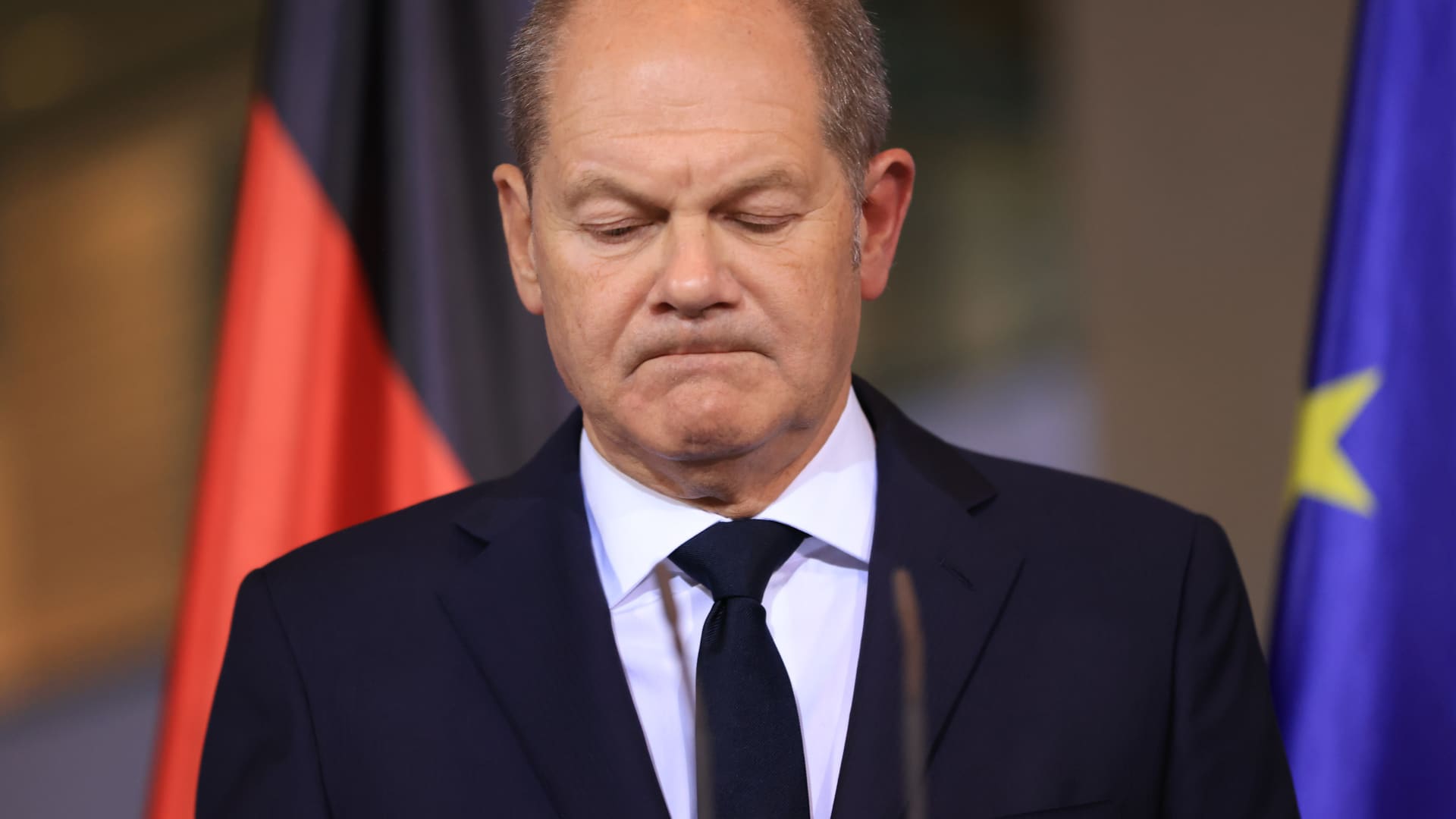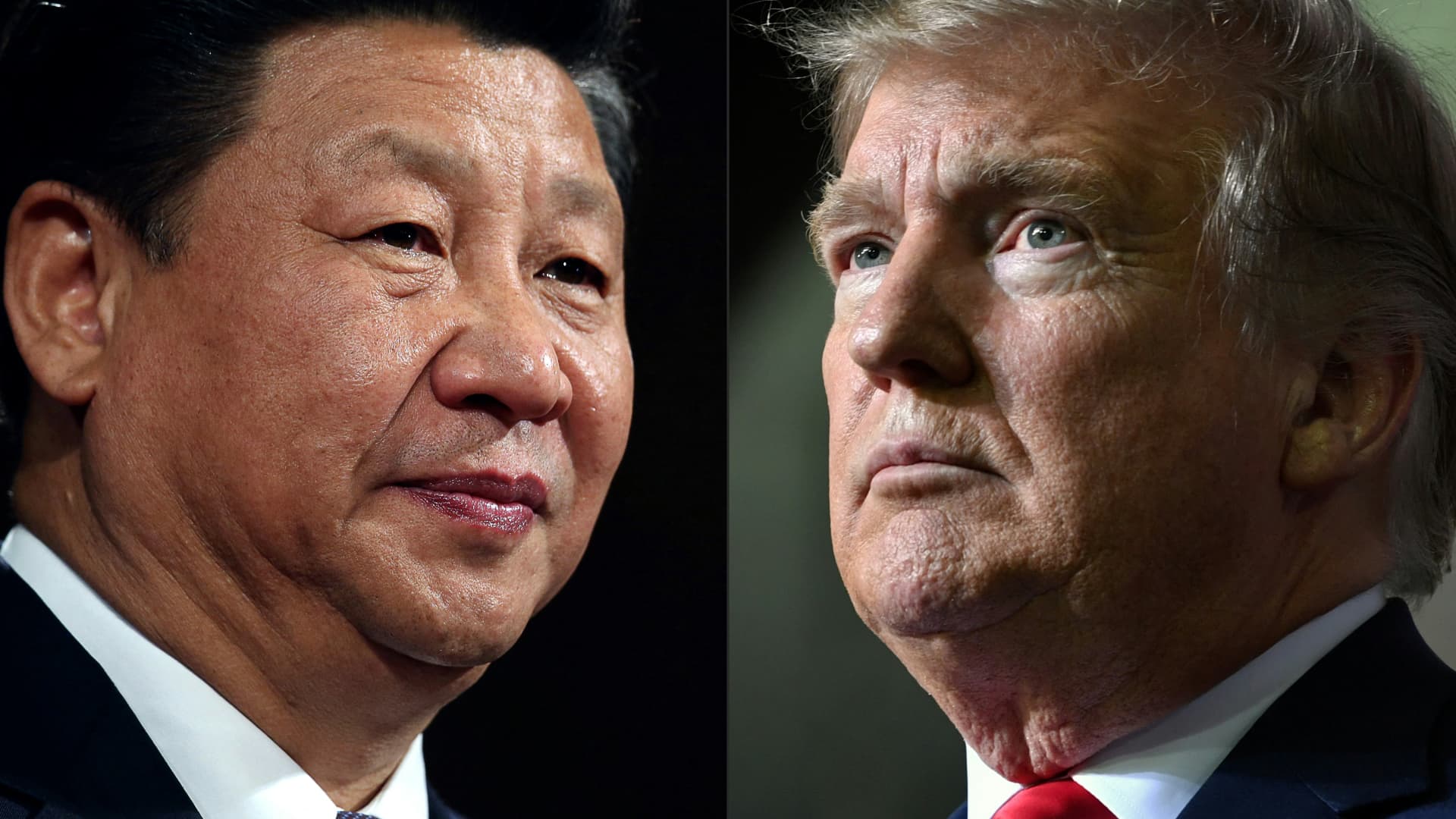Olaf Scholz, Germany’s chancellor, during a news conference at the Chancellery in Berlin, Germany, on Monday, Nov. 4, 2024.
Krisztian Bocsi | Bloomberg | Getty Images
Donald Trump’s election as U.S. President could mark yet another major blow for the struggling German economy.
Germany narrowly, and unexpectedly, skirted a technical recession in the third quarter, with preliminary data showing its gross domestic product grew by 0.2% after a 0.3% contraction in the previous quarter. The print came after the German economy ministry in October said it was now expecting the country’s economy will contract, rather than grow this year.
Not only is the country’s economy struggling to pick up pace, but a series of key indicators have also been painting a lackluster picture. That includes Germany’s composite PMI, which rose slightly in October, but remained in contraction territory, according to data from S&P Global and Hamburg Commercial Bank published Wednesday.
Trump’s victory could make matters worse.
“Donald Trump’s likely election victory marks the beginning of the most difficult economic moment in the history of the Federal Republic of Germany,” Moritz Schularick, president of the Kiel Institute for the World Economy, said in a note after Trump claimed victory.
“In addition to the domestic structural crisis, the country now faces massive foreign trade and security policy challenges for which we are not prepared,” Schularick said, adding that the economic policies outlined by Trump will put additional pressure on growth across Europe.
Reliance on exports
The German economy is heavily reliant on exports — and Trump is set to slap tariffs and other restrictions on imports.
The German statistics office Destatis last month said that the U.S.’ importance as a trading partner for Germany has been growing. The U.S. has been Germany’s second largest trading partner behind China since 2021, but overtook Beijing in the first half of this year.
Around 9.9% of German exports went to the U.S. in 2023 in terms of value, according to Destatis.
Trump has previously suggested he could put blanket tariffs of 10% to 20% on almost all imports, if he were elected, regardless of their origin.
German exporters may therefore now suffer, the ifo economic institute said in a note on Wednesday.
“German exporters … must expect severe losses if Trump makes good on his threat to impose basic tariffs of 20 percent on US imports from all trading partners,” it said.
“These measures by the re-elected US President would mean considerable economic damage of EUR 33 billion in Germany alone,” ifo added, estimating that German exports to the U.S. could shed roughly 15% as a result.
Morningstar DBRS meanwhile identified autos and chemicals as two of the sectors most exposed to potential Trump tariffs — both of which historically have been key pillars of the German industry.
Lisandra Flach, director of the ifo Center for International Economics, said that Germany and the European Union must now take their own measures, as they need to anticipate the U.S. distancing itself from global cooperation.
“Germany and the EU must now strengthen their position through measures of their own. These include deeper integration of the EU services market and credible retaliatory measures against the US,” she said.
German political reaction
The U.S. election comes at a time when Germany’s own government is in turmoil. On Wednesday, Chancellor Olaf Scholz sacked then Finance Minister Christian Lindner, and the ruling coalition effectively broke apart.
Senior German political figures including Scholz and Lindner had on Wednesday congratulated Trump on his election.
Speaking to journalists, Scholz said Germany would remain a “reliable” partner, according to a CNBC translation.
Prior to his sacking, Lindner had shown openness to engage with Trump, saying on X that Europe should “stretch out a hand” to the Republican politician.
“In the EU, NATO and also Berlin we now need to do our economic- and security policy homework more urgently than ever,” Lindner said.
Speaking to CNBC last month, Lindner had warned that U.S. trade policy could be an issue, if Trump were elected.
“In that case we need diplomatic efforts to convince whoever enters the White House that it’s not in the best interest of the U.S. to have a trade conflict with [the] European Union. We would have to consider retaliation,” he said at the time.











